

Trending. When the Twitter account of a prominent Yemeni political commentator and high-profile social media user fell silent on 14 August, it did not go unnoticed.
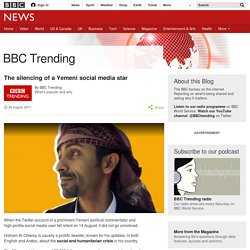
Hisham Al-Omeisy is usually a prolific tweeter, known for his updates, in both English and Arabic, about the social and humanitarian crisis in his country. The 38-year-old has around 25,000 followers, among them many international media outlets, journalists and humanitarian workers who turn to him for insights about what's happening within Yemen. So when his account suddenly went quiet, those who have come to rely on him for valuable information, quickly knew something was wrong. 2014 International Year of Family Farming. The Historical Association. Website Creation Made Easy. Where To After The Digital Education Revolution? By Mal Lee.
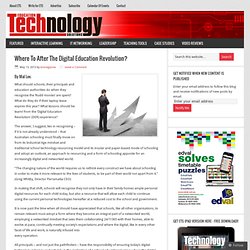
What should schools, their principals and education authorities do when they recognise the ‘Rudd monies’ are spent? What do they do if their laptop lease expires this year? What lessons should be learnt from the ‘Digital Education Revolution’ (DER) experience? The answer, I suggest, lies in recognising – if it is not already understood – that Australian schooling must finally move on from its Industrial Age mindset and traditional school technology resourcing model and its insular and paper-based mode of schooling and adopt an outlook, an approach to resourcing and a form of schooling apposite for an increasingly digital and networked world. “The changing nature of the world requires us to rethink every construct we have about schooling in order to make it more relevant to the lives of students, to be part of their world not apart from it.” Report: Teachers Better at Using Tech than Digital Native Students. Research Report: Teachers Better at Using Tech than Digital Native Students By Dian Schaffhauser10/22/14 It's time to give up the notion that "digital natives" are more tech savvy than their teachers.
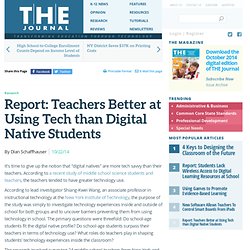
According to a recent study of middle school science students and teachers, the teachers tended to have greater technology use. According to lead investigator Shiang-Kwei Wang, an associate professor in instructional technology at the New York Institute of Technology, the purpose of the study was simply to investigate technology experiences inside and outside of school for both groups and to uncover barriers preventing them from using technology in school. The research involved surveying 24 middle-school teachers from New York and Utah aged 23 to 56. Science teachers specifically were chosen for their overall pioneering spirits. The report's conclusion: "Today's school-age learners are no more technology savvy than their teachers. About the Author. An investigation of middle school science teachers and students use of technology inside and outside of classrooms: considering whether digital natives are more technology savvy than their teachers.
Bell, R.
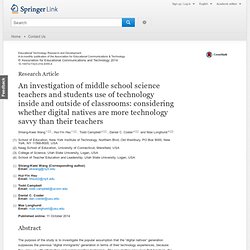
L., Maeng, J. L., & Binns, I. C. (2013). Learning in context. Technology integration in a teacher preparation program informed by situated learning theory. Bennett, S., Maton, K., & Kervin, L. (2008a). Bennett, S., & Maton, K. (2010). Bennett, S., Maton, K., & Kervin, L. (2008b). Bradley, D., Noonan, P., Nugent, H., & Scales, B. (2008). Brown, J. Bullen, M., Belfer, K., Morgan, T., & Qayyum, A. (2008). Psychological Science The pen is mightier than the keyboard. The George Institute for Global Health. Five billion people have no reliable access to essential health care.
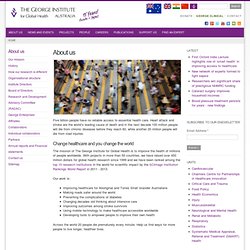
Heart attack and stroke are the world’s leading cause of death and in the next decade 100 million people will die from chronic diseases before they reach 60, while another 20 million people will die from road injuries. The mission of The George Institute for Global Health is to improve the health of millions of people worldwide. With projects in more than 50 countries, we have raised over 450 million dollars for global health research since 1999 and we have been ranked among the top 10 research institutions in the world for scientific impact by the SCImago Institution Rankings World Report in 2011 - 2013.
Our work is: Across the world 20 people die prematurely every minute. A history of the future in 100 objects - Late Night Live. What will be the 100 most important objects of the next 100 years?
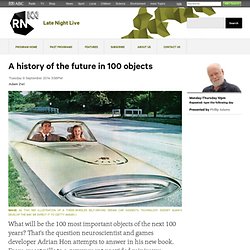
That’s the question neuroscientist and games developer Adrian Hon attempts to answer in his new book. From smart pills to a government-provided minimum income, Adam Zwi takes a look at the objects and ideas that could dominate the next century. In 2010, the British Museum and BBC Radio 4 collaborated to produce a book and radio series titled A History of the World in 100 Objects. They used 100 pieces from the museum's vast collection as a starting point to explain various parts of human history—from a 1.8 million-year-old rock hand-axe, to a Visa credit card that complies with the principles of Islamic banking. That project served as the inspiration for neuroscientist and games designer Adrian Hon, but he turned the entire idea on its head. There will still be serious problems. Unsurprisingly, the book's major theme is technology.